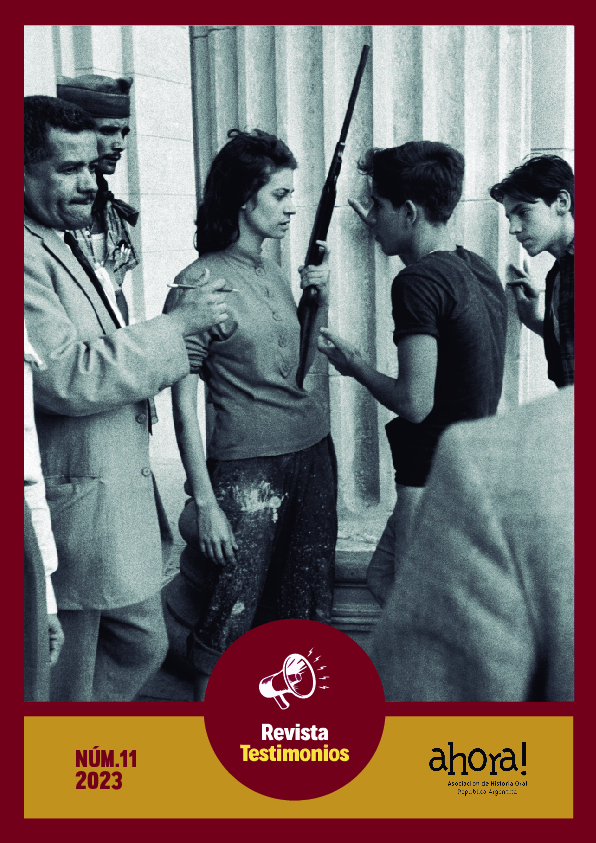The conflict in Volkswagen (Monte Chingolo) in 1983: an analysis of workers' culture and about relations between production and reproduction areas
Keywords:
Labour movement, Activism, Volkswagen, Conflict, Social reproductionAbstract
This article refers to aspects of the conflict developed between february and may of 1983 at the plant of Volkswagen in Monte Chingolo. Based on written sources and two interviews with activists who were protagonists of the conflict, we analyze this dispute between capital and labor through the prism of concepts related to working class culture, and about relations between production and social reproduction areas. In first place, we focus on the role of left parties who had insertion in this company in terms of their importance in the assembly and development of the union representation in the factory of Monte Chingolo and the characteristics of the struggle in 1983. Secondly, we analyze the impact of the conflict in the field of social reproduction. On the one hand, regarding the relationship of the workers with the residents of Monte Chingolo. On the other, in relation to the two activists interviewed, we point out the tensions that were generated with their families due to the duration of the confrontation with the enterprise.
References
Bhattacharya, T. (2017). “Cómo no saltearse la clase”, en: Bhattacharya, T. Social Reproduction Theory: remapping class, recentering oppression, London: Pluto Press. [Versión en español].
Bil, D. (2018). Los industriales automotores y la crisis de la década de 1980 en Argentina, Revista de economía del Caribe, Año X, N° 21, Barranquilla, p. 105-130.
Camarero, H. (2007). A la conquista de la clase obrera. Los comunistas y el mundo del trabajo en la Argentina, 1920-1935, Buenos Aires: Siglo XXI Editora.
Casola, N. (2021). Las bolcheviques. Izquierda partidaria y movimiento de mujeres en la Argentina reciente. Archivos De Historia Del Movimiento Obrero Y La Izquierda, N° 19, p. 43-64.
D’Antonio, D. (2000). “Representaciones de género en la huelga de la construcción. Buenos Aires, 1935-1936”, en: Gil Lozano, Fernanda, Valeria Pita y María Gabriela Ini. Historia de las mujeres en la Argentina. Tomo II: siglo XX. Buenos Aires: Taurus. p. 245-265.
Gilly, A. (1986). La anomalía argentina (Estado, corporaciones y trabajadores), Cuadernos del Sur, Año 2, N° 4, Buenos Aires, p. 5-39.
González, M. (2003). “Los salarios en Argentina: Una perspectiva de largo plazo”, XXIV Congreso ALAS, Arequipa, Perú.
González Bombal, I. (1988). Los vecinazos. Las protestas barriales en el Gran Buenos Aires, 1982-83, Buenos Aires: IDES.
Gramsci, A. (2004). Antología, Buenos Aires: Siglo XXI.
Mangiantini, M. (2019). La huelga de 1966 en el Puerto de Buenos Aires. ¿Caso excepcional de resistencia o preludio de la radicalización?, Avances del Cesor, Vol. XVI, N° 20, p. 53-76.
Molinaro, L. (2017). Alrededor de ochenta días de lucha sin vueltas. El conflicto en el establecimiento de Volkswagen en Monte Chingolo (febrero-mayo de 1983), A Contracorriente. Una revista de historia social y literatura de América Latina, Vol. 14, N° 3, North Carolina, p. 86-109.
Novelo, Victoria, Miguel Ángel Gómez, Jorge Aceves, Ana Castro y Ariel García. (1986). “Propuestas para el estudio de la cultura obrera”, Nueva Antropología, Vol. 8, núm. 29, México DF, pp. 65-83.
Plis-Sterenberg, G. (2003). Monte Chingolo. La mayor batalla de la guerrilla argentina, Buenos Aires: Planeta.
Portelli, A. (1991). “Lo que hace diferente a la Historia Oral”, en: Schwarzsten, Dora (comp.). La historia oral, Buenos Aires: CEAL. p. 36-52.
Pozzi, P. (2008). Oposición obrera a la dictadura, 1976-1982, Buenos Aires: Imago Mundi.
Sangrilli, C. (2010). La normalización sindical entre la dictadura y los comienzos de la democracia (1979-1984), Estudios Sociales, Vol. 39, N° 1, Santa Fe, p. 147-170.
Santella, A. y Andújar, A. (2007). El Perón de la fábrica éramos nosotros: las luchas de Villa Constitución 1970-1976. Buenos Aires: Desde el Subte.
Tronti, M. (2001). Obreros y Capital. Madrid: Akal.
Varela, P. (2015). La disputa por la dignidad obrera. Sindicalismo de base fabril en la zona norte del conurbano bonaerense 2003-2014. Buenos Aires: Imago Mundi.
Varela, P. (2020). La reproducción social en disputa: un debate entre autonomistas y marxistas, Archivos de historia del movimiento obrero y la izquierda, Año VIII, N°16, Buenos Aires, p. 71-92.
Vogel, L. (1979). Questions on the woman question, Monthly Review, Vol. 31, N°2, New York, p. 39-59.
Vogel, L. (2013). Marxism and the Oppression of Women. Toward a Unitary Theory, London: Historical Materialism-Brill.
Tilly, C. (1986). The Contentious French. Cambridge: Harvard University Press.
Williams, R. (2009). Marxismo y Literatura. Buenos Aires: Las cuarenta.
Zorzoli, L. (2015). “La normativa sindical entre la dictadura y el alfonsinismo, propuesta de sistematización”, en: Schneider, A. y Ghigliani, P. (comps.). Clase obrera, sindicatos y Estado. Argentina (1955-2010). Buenos Aires: Imago Mundi. P. 149-171.
Downloads
Published
Issue
Section
License
Copyright (c) 2022 Leandro Molinaro

This work is licensed under a Creative Commons Attribution-NonCommercial-ShareAlike 4.0 International License.
No se permite un uso comercial de la obra original ni de las posibles obras derivadas, la distribución de las cuales se debe hacer con una licencia igual a la que regula la obra original.













